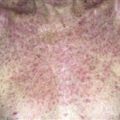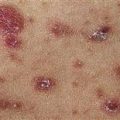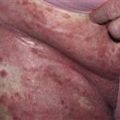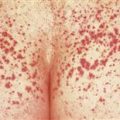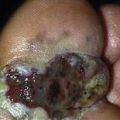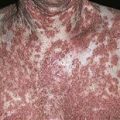97
Flea bites
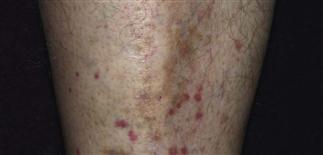
Flea bites occur in a cluster or group, and appear as small purpuric macules. They typically occur on the lower legs. Fleas jump but cannot reach higher than above the calf.
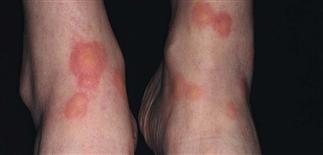
Some people are very sensitive to flea bites, which result in large wheals or hive-like plaques. This is referred to as papular urticaria.
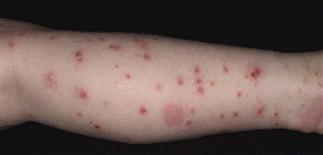
A child’s flea bites were excoriated and became infected. These lesions will heal with scars.
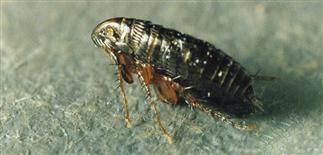
Fleas are tiny, red-brown, hard-bodied, wingless insects that are capable of jumping approximately 60 cm. They live in rugs and on the bodies of animals.
DESCRIPTION AND HISTORY
The flea itself is a small, red-brown, hard-bodied, wingless insect. It is flattened laterally so that it can squeeze between hairs of hosts. Flea bites present as pruritic macular or papular eruption on the legs, and is self-limited. Depending on the patient’s sensitivity, it may subside in days to weeks. The flea eggs can lie dormant for over a year and can reactivate because of the vibrations from footsteps. Pants and socks may offer some protection.
PHYSICAL FINDINGS
• Initially, tiny red dots or bite puncta may be seen in clusters or groups around the calves and ankles. • Red to purpuric, raised urticarial lesions known as papular urticaria develop in hypersensitive patients, especially children. Pruritus can be intense in hypersensitive patients. The persistent scratching can lead to round, white scars after healing. • Diagnosis is usually not difficult.
TREATMENT
• Bites are treated symptomatically. Topical anti-pruritics such as Sarna lotion can help. • Infected lesions require antibiotics. This is uncommon. • Mild to moderately potent topical steroids are useful for treating papular urticaria. • Fleas must be eradicated. The infested animal, its bedding and rugs must be treated.

